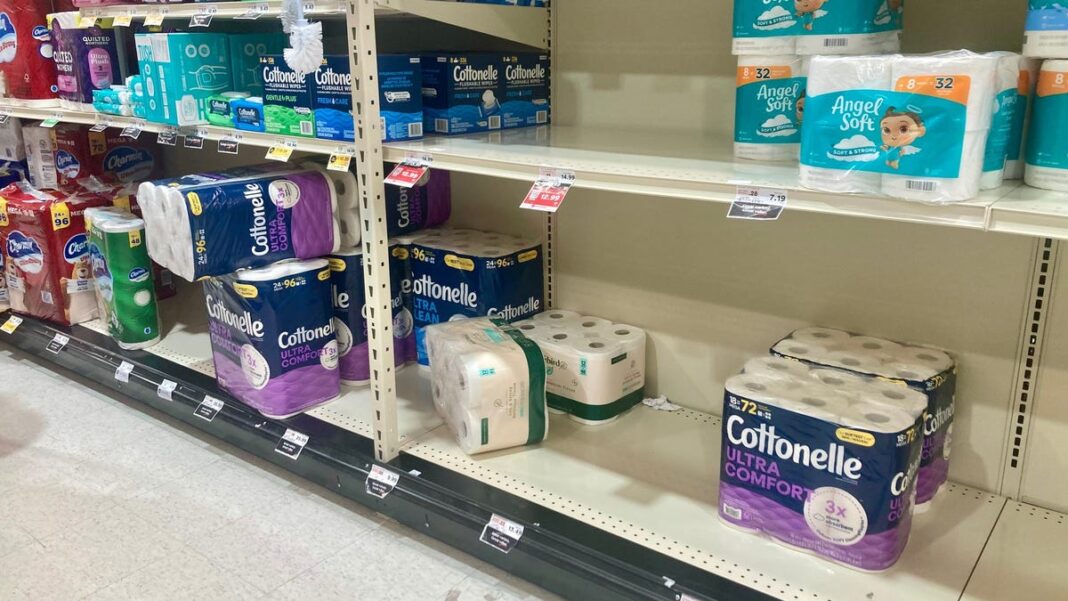Toilet Paper Not Likely Affected by Port Strike: ‘People Need to Relax’
Panic buying poses a bigger risk for toilet paper shortages than the current dockworker strike affecting 36 East and Gulf Coast ports.
Update: U.S. port workers and operators have reached an agreement to end the East Coast strike effective immediately on Oct. 3.Read more.
Shoppers itching to rush out and stock up on toilet paper due to the ongoing union dockworker strike should reconsider: such behavior could worsen the situation.
When 45,000 union members walked off the job on Tuesday over stalled contract negotiations, it effectively closed 36 East and Gulf Coast ports, which are responsible for about half of all U.S. imports. Although this sudden halt may remind many of the COVID-19 pandemic, toilet paper is not among the products anticipated to be directly impacted by the strike.
According to North Carolina State’s College of Natural Resources, over 99% of tissue products used in the U.S. are manufactured domestically. Nearly 90% of tissue manufacturers in the country use recycled materials, as reported by the American Forest & Paper Association, which represents businesses in the paper and wood sectors.
In a statement to YSL News, the American Forest & Paper Association acknowledged reports of toilet paper shortages, some linked to the port strike: “While we encourage the ILA and USMX to resolve this strike swiftly to restore our members’ ability to export products, we want to clarify that we do not expect any disruption to tissue product deliveries in the U.S.”
This discussion around toilet paper has led at least one supermarket chain to urge customers against panic buying.
“Our suppliers’ paper products are manufactured in the U.S. and remain unaffected by the ongoing port strike,” said Publix, a popular grocery chain in the South, in a statement to a local Atlanta news outlet, WXIA. “We encourage customers to buy only what they truly need to help avoid temporary shortages.”
‘People Need to Relax and Stop Hoarding’
Manufacturers in the U.S. produce billions of rolls of toilet paper annually, more than enough to satisfy consumer demand, according to Ronalds Gonzalez, an associate professor in the Department of Forest Biomaterials at NC State.
Panic buying leads to supply issues when customers deplete store inventories, which typically stock only a few weeks’ worth of items.
“People need to relax and purchase only what they require to keep inventories stable,” Gonzalez urged.
Some toilet paper manufacturers do integrate eucalyptus pulp into their products, including Georgia-Pacific, Procter & Gamble, and Kimberly-Clark, as noted by the College of Natural Resources. While eucalyptus pulp, imported from Brazil, contributes to the softness and absorbency of toilet paper, limited access shouldn’t inhibit shoppers from finding recycled paper products, according to Gonzalez, who highlighted that even these commercial-grade items aren’t shielded from panic buying.
The American Forest & Paper Association reassured consumers: “Rest assured, tissue products are continually produced and distributed – just as they are throughout the year.” They also confirmed that their members would keep manufacturing these essential products in the U.S. and utilize various transportation methods to ensure availability in stores nationwide.
Which Products Could Be Affected by the Dockworker Strike?
This strike marks the first action taken by the International Longshoremen’s Association (ILA) since 1977. While essentials like toilet paper, paper towels, gasoline, and natural gas are not expected to see immediate impact, numerous other products might experience disruptions.
Chris Tang, a supply chain management expert at UCLA, previously informed YSL News of potential shortages or price increases for certain items:
- Seafood: Perishable items like Icelandic cod or shrimp from Thailand and Ecuador are difficult to transport by train as they require refrigeration.
- Electronics: Devices such as cell phones and computers, sourced from Southeast Asian countries like Vietnam, Indonesia, and Thailand, are routed through East Coast ports.
- Pharmaceuticals: Although these can be shipped by air, consumers may see shortages of medications if the situation isn’t resolved in about a month.
- Vehicles and Auto Parts: European cars and related components often travel through East Coast and Gulf Coast ports, with the Port of Baltimore leading in car imports, according to experts.
- Machinery Parts: East Coast ports are primary hubs for incoming machinery, fabricated steel, and precision tools.
- Alcohol: There could be a shortage of wine, beer, and spirits coming from Europe, South America, or the Caribbean.
- Bananas: Approximately 75% of the nation’s bananas arrive via East Coast and Gulf Coast ports, as noted by Jason Miller, the interim chair of Michigan State University’s supply chain management department. Additionally, since bananas are perishable, it isn’t cost-effective to transport them by air, Miller mentioned in a LinkedIn post.

